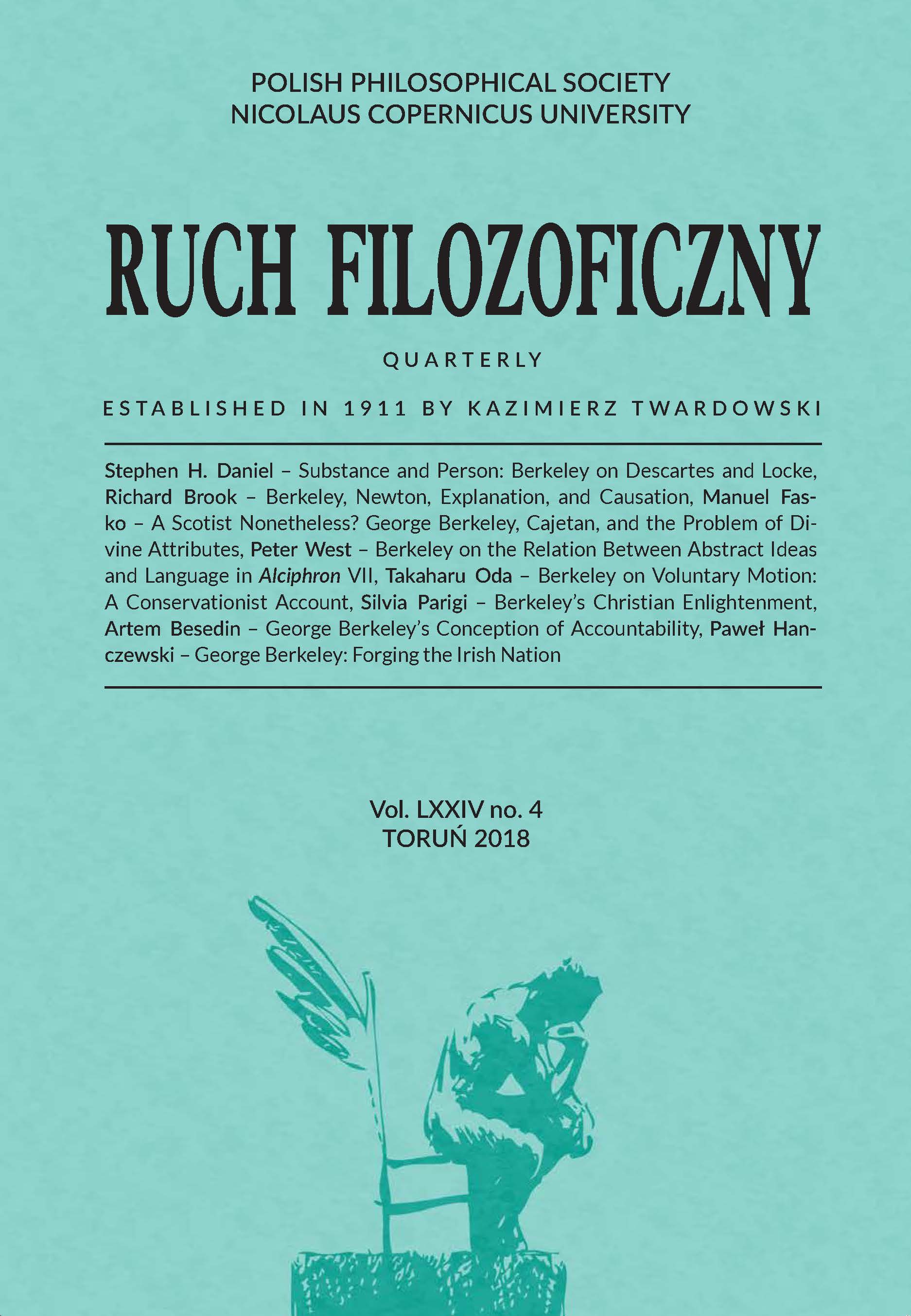Substance and Person: Berkeley on Descartes and Locke
DOI:
https://doi.org/10.12775/RF.2018.046Słowa kluczowe
Berkeley, substancja duchowa, Descartes, Locke, aktywność, wolaAbstrakt
Substancja i osoba: Berkeley na temat Descartes’a i Locke’a
W dziełach powstałych po roku 1720 w swych uwagach na temat Descartes’a Berkeley koncentruje się na mechanicyzmie, zaś w tych, w których odnosi się do Locke’a – na ogólnych ideach abstrakcyjnych. Przestrzega przed odwoływaniem się do zasad metafizycznych podczas wyjaśniania obserwowalnych regularności, przy czym kwestię tę ujmuje na tyle szeroko, aby obejmowała także substancje duchowe (włączając w to Boga). Gdy Berkeley określa substancję duchową mianem ducha, kładzie nacisk na to, w jaki sposób osoba jest po prostu wolą rozróżniania idei i wiązania ich ze sobą, a nie czymś, co dokonuje owego rozróżniania. W tym znaczeniu substancji nie można pojmować jako czegoś odrębnego od jej aktywności.
Bibliografia
Atherton, Margaret. “Berkeley’s Last Word on Spirit.” In Essays on the Concept of Mind in Early–Modern Philosophy, edited by Petr Glombíček and James Hill. Cambridge, UK: Cambridge Scholars Publishing, 2010, 115–130.
Berkeley, George. Philosophical Works, edited by Michael Ayers. Rutland, VT: Charles E. Tuttle, 1992.
Berkeley, George. Works of George Berkeley. 9 vols., edited by A. A. Luce and T. E. Jessop. London: Thomas Nelson and Sons, 1948–1957.
Bettcher, Talia Mae. “Berkeley and Hume on Self and Self–Consciousness.” In Topics in Early Modern Philosophy of Mind, edited by Jon Miller. New York: Springer, 2009, 193–222.
Bettcher, Talia Mae. “Berkeley’s Theory of Mind: Some New Models.” Philosophy Compass 6 (2011): 689–698.
Daniel, Stephen H. “Berkeley’s Non-Cartesian Notion of Spiritual Substance.” Journal of the History of Philosophy 56 (2018): 659–682.
Daniel, Stephen H. “Berkeley’s Notion of Spiritual Substance.” In New Interpretations of Berkeley’s Thought, ed. Stephen H. Daniel. Amherst, NY: Humanity Books, 2008, 203–230.
Daniel, Stephen H. “How Berkeley Redefines Substance: A Reply to My Critics.” Berkeley Studies 24 (2013): 40–50.
Descartes, Rene. Philosophical Writings of Descartes, vols. I–II. Edited by John Cottingham et al. New York: Cambridge University Press, 1984–1985.
Flage, Daniel E. Berkeley. Malden, MA: Polity, 2014.
Gordon–Roth, Jessica. “Locke on the Ontology of Persons.” Southern Journal of Philosophy 53 (2015): 97–123.
Hight, Marc A. and Walter Ott, “The New Berkeley.” Canadian Journal of Philosophy 34 (2004): 1–24.
Jurin, James. Geometry no Friend to Infidelity. London: T. Cooper, 1734.
Locke, John. Essay concerning Human Understanding. Edited by Peter H. Nidditch. Oxford: Clarendon Press, 1975.
Locke, John. Works of John Locke, new ed. 10 vols. London: Thomas Tegg et al., 1823.
LoLordo, Antonia. Locke’s Moral Man. New York: Oxford University Press, 2012.
Reid, Thomas. Essays on the Intellectual Powers of Man, edited by Derek R. Brookes. University Park, PA: Pennsylvania State University Press, 2002.
Roberts, John R. A Metaphysics for the Mob: The Philosophy of George Berkeley. New York: Oxford University Press, 2007.
Storrie, Stefan Sean Gordon. “Berkeley’s Apparent Cartesianism in De Motu.” Archiv für Geschichte der Philosophie 94 (2012): 353–366.
Tipton, I. C. “Berkeley’s View of Spirit.” In New Studies in Berkeley’s Philosophy, edited by Warren E. Steinkraus. New York: Holt, Rinehart, and Winston, 1966, 59–71.
Winkler, Kenneth P. “Locke on Personal Identity.” Journal of the History of Philosophy 29 (1991): 201–226.
Yolton, John. A Locke Dictionary. Oxford: Blackwell, 1993.
Pobrania
Opublikowane
Jak cytować
Numer
Dział
Statystyki
Liczba wyświetleń i pobrań: 467
Liczba cytowań: 0



